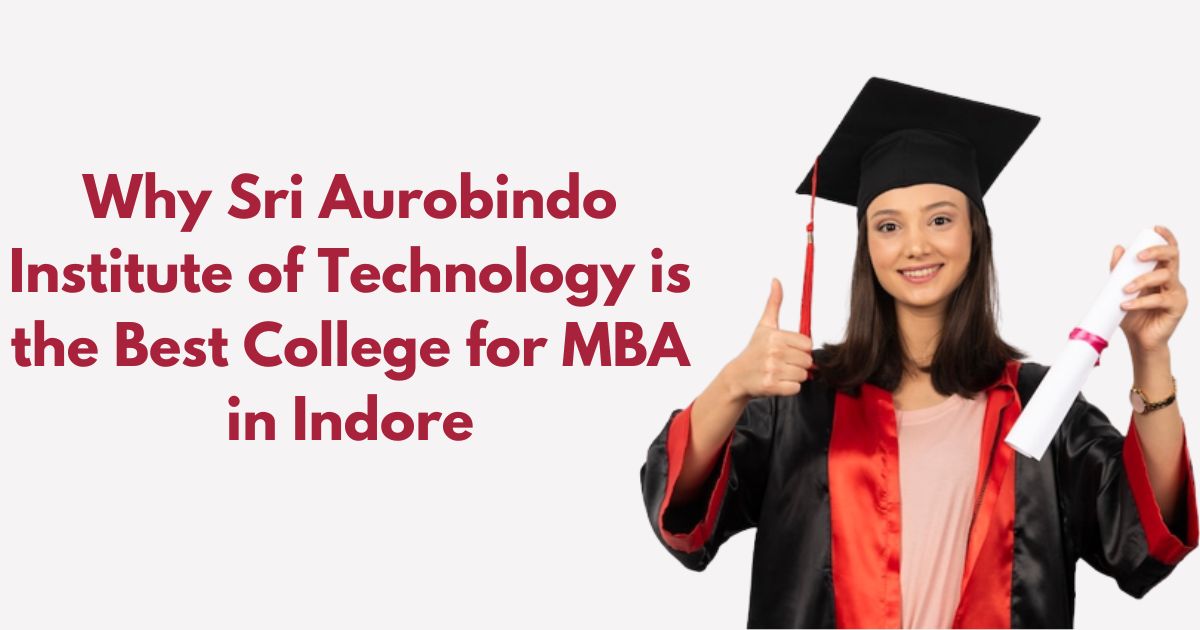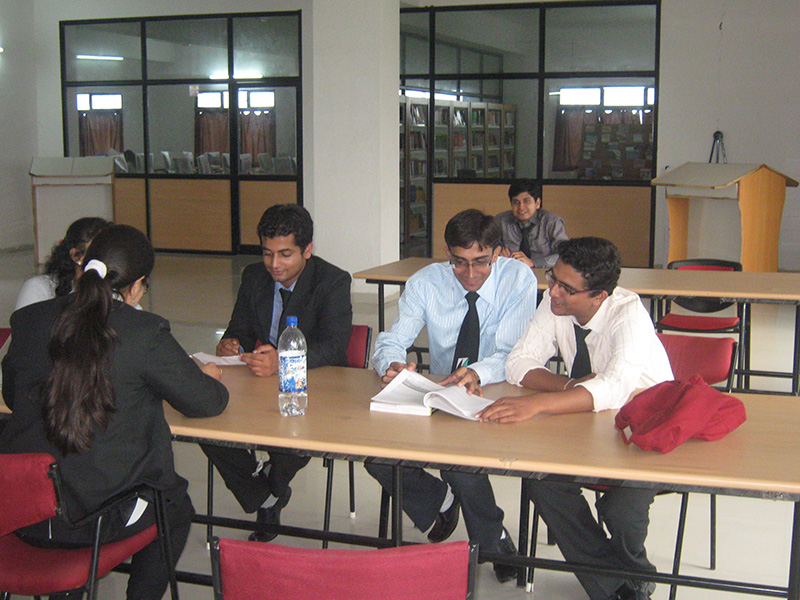2 min read
Why Sri Aurobindo Institute of Technology is the Best College for MBA in Indore
Sri Aurobindo Institute of Technology (SAIT) is a renowned and highly esteemed institution for engineering education in India. With over 14 years of...
4 min read
 Admin
:
Aug 29, 2023 1:48:24 PM
Admin
:
Aug 29, 2023 1:48:24 PM

In the dynamic landscape of business and management, the role of human resource management (HRM) has evolved significantly over the years. Human resources are the lifeblood of any organization, and managing them effectively has become a key determinant of an organization's success.
With this understanding, pursuing a Master of Business Administration (MBA) in Human Resource Management from an esteemed institution like Sri Aurobindo Institute of Management (SAIM) can offer aspiring professionals a gateway to a rewarding and impactful career. In this blog, we will delve into the scope and opportunities that an MBA in Human Resource Management can provide, particularly through the lens of SAIM's comprehensive program.
Understanding MBA in Human Resource Management
Before we delve into the scope and opportunities, let's first understand what an MBA in Human Resource Management entails. This specialized MBA program is designed to equip students with a deep understanding of the various facets of managing an organization's workforce.
It covers a wide array of topics including recruitment, talent acquisition, employee training and development, performance appraisal, compensation management, labour laws, and employee relations. A well-rounded MBA in HRM, such as the one offered at SAIM, goes beyond theoretical knowledge and emphasizes the practical application of concepts through case studies, simulations, and real-world projects.
Scope of MBA in Human Resource Management
The scope of an MBA in Human Resource Management is vast and diverse, as HRM is an integral function in organizations across industries. Here are some key areas where HRM professionals play a pivotal role:
1. Talent Acquisition and Recruitment
The process of identifying, attracting, and hiring the right talent is a critical function within HRM. HR professionals need to devise effective strategies to ensure that the organization's workforce is skilled, diverse, and aligned with the company's goals. With an MBA in HRM, individuals can excel in understanding market trends, conducting interviews, and implementing recruitment strategies that align with the organization's culture.
2. Employee Training and Development
Continuous learning and skill enhancement are crucial for both individual growth and the organization's success. HR professionals with expertise in training and development can design programs that enhance employees' skills, boost their motivation, and contribute to higher productivity. An MBA in HRM equips students with the knowledge to create training modules that address specific needs and align with the organization's long-term goals.
3. Performance Management and Appraisal
Evaluating employee performance objectively and fairly is a cornerstone of HRM. Professionals in this field need to design performance appraisal systems that provide constructive feedback, recognize achievements, and identify areas for improvement. An MBA in HRM prepares individuals to implement performance management systems that contribute to a culture of continuous improvement.
4. Compensation and Benefits
Compensation goes beyond just salaries—it includes various benefits, incentives, and rewards that motivate employees and ensure their well-being. HR professionals specializing in compensation management can strategize and implement comprehensive packages that attract and retain top talent while keeping the organization's financial health in mind.
5. Employee Relations and Conflict Resolution
Maintaining a healthy work environment and managing employee relations is another crucial aspect of HRM. Professionals in this field need to be adept at resolving conflicts, addressing grievances, and fostering a positive organizational culture. An MBA in HRM provides the knowledge and skills to create a harmonious workplace where employees can thrive.
6. Strategic HR Planning
Aligning HR strategies with the organization's overall business goals is a strategic imperative. HR professionals with an MBA in HRM can contribute significantly to an organization's success by designing HR plans that anticipate future talent needs, adapt to changing business landscapes, and foster innovation and growth.
Opportunities after MBA in Human Resource Management
An MBA in Human Resource Management opens up a plethora of career opportunities across various sectors. Here are some roles that graduates can explore:
HR Manager/Director
HR managers or directors are responsible for overseeing the entire HR function within an organization. They develop and implement HR strategies, ensure compliance with labour laws, and contribute to strategic decision-making.
Talent Acquisition Specialist/Recruiter
Talent acquisition specialists are tasked with identifying and hiring the right candidates for the organization. They work closely with department heads to understand staffing needs, create job descriptions, conduct interviews, and negotiate offers.
Training and Development Manager
Training and development managers design and implement employee training programs that align with the organization's goals. They assess training needs, develop curriculum, and measure the effectiveness of training initiatives.
Compensation and Benefits Manager
Professionals in this role design and manage compensation packages, including salaries, bonuses, and benefits. They ensure that the organization's compensation structure remains competitive and fair.
Employee Relations Specialist
Employee relations specialists focus on maintaining a positive work environment and handling employee concerns and conflicts. They mediate disputes, implement employee engagement initiatives, and foster a sense of unity within the organization.
HR Consultant
HR consultants provide expert advice to organizations on various HR-related matters. They may be hired on a project basis to address specific challenges, such as restructuring, change management, or diversity and inclusion programs.
Labour Relations Manager
Labour relations managers handle interactions between management and labour unions. They negotiate collective bargaining agreements, address labour disputes, and ensure compliance with labour laws.
Why Choose SAIM for an MBA in Human Resource Management
Sri Aurobindo Institute of Management (SAIM) stands out as a premier institution that offers an exceptional MBA program in Human Resource Management. Here's why SAIM could be the ideal choice for your educational journey:
Comprehensive Curriculum
SAIM's MBA program in HRM offers a well-rounded curriculum that covers the core principles of human resource management along with advanced topics like strategic HR planning, organizational development, and change management.
Experienced Faculty
The faculty at SAIM comprises seasoned professionals and academicians with vast experience in the field of HRM. Their expertise ensures that students receive practical insights that are applicable to real-world scenarios.
Industry Exposure
SAIM's strong industry connections and collaborations provide students with opportunities for internships, live projects, and interactions with HR professionals from diverse sectors. This exposure bridges the gap between classroom learning and practical application.
Holistic Development
At SAIM, emphasis is placed not only on academic excellence but also on the holistic development of students. Soft skills, leadership qualities, and ethical values are integrated into the curriculum to shape well-rounded professionals.
Placement Support
SAIM's dedicated placement cell assists students in securing internships and job placements with reputed organizations. The institute's strong network with industry partners enhances students' chances of landing rewarding career opportunities.
Conclusion
In a rapidly evolving business landscape, the role of human resource management is more critical than ever. Pursuing an MBA in Human Resource Management from an institution like Sri Aurobindo Institute of Management (SAIM) can provide aspiring HR professionals with the knowledge, skills, and opportunities to excel in their careers.
With a comprehensive curriculum, experienced faculty, and a commitment to holistic development, SAIM equips students to thrive in diverse HR roles and contribute to the success of organizations across industries. If you're passionate about people and aspire to make a meaningful impact in the world of business, an MBA in HRM from SAIM could be your path to a fulfilling and prosperous career.

2 min read
Sri Aurobindo Institute of Technology (SAIT) is a renowned and highly esteemed institution for engineering education in India. With over 14 years of...

As a manager, you are responsible for driving results and ensuring that your team is productive and successful. However, even the best managers can...

Selecting the right MBA specialization is akin to embarking on a tailor-made journey; it's not just about acquiring a degree but about sculpting a...